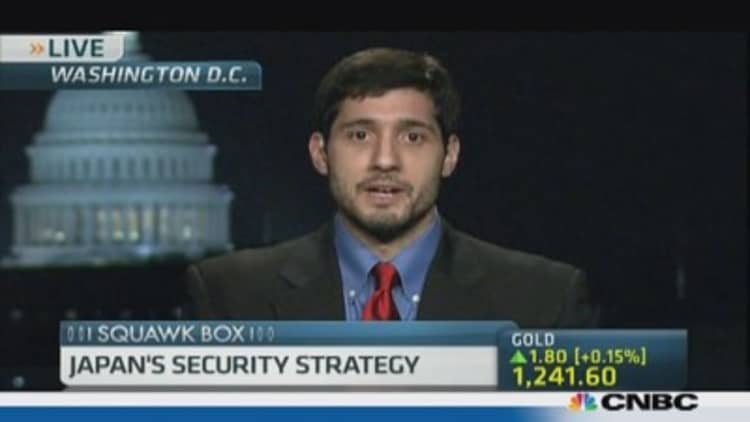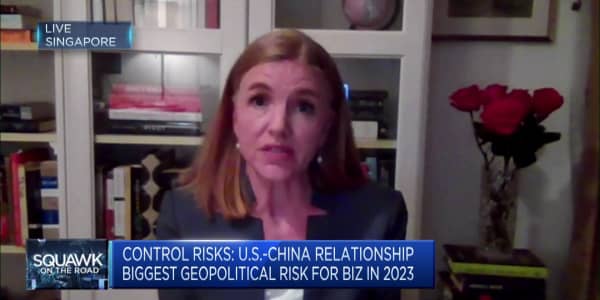A territorial dispute between China and Japan has flared-up again in recent months, bringing geopolitical risk to the forefront in 2014. But just how serious could strains between Asia's two biggest economies get?
"The situation is set up in a manner that a slight nudge in either direction could make something happen," said John Rutledge, chief investment strategist at Safanad in California.
(Read more: Ten trends that will shape Asia in 2014: Carnegie)
Political analysts say that military conflict between Asia's heavyweights is unlikely since it's in neither party's interest. Furthermore, Japan is allied to the U.S., which China does not want to antagonize.
Still, they add that the situation in Asia remains a dangerous one: A belligerent China is looking to assert its position in the South China and East China Seas, alarming neighbors as well as the U.S., the world's remaining superpower.
"Bluntly put, Beijing's long-term strategic intentions inspire deep anxieties," think tank Carnegie Endowment for International Peace said in a report this month.
Analysts say the Japan-China relationship is one of the most important bilateral tie-ups in the world in terms of its impact on economic and regional stability. And with bilateral trade between the two Asian powers estimated at some $300 billion, any deterioration in relations is likely to have significant repercussions for Asia's economy.
For instance, Japanese shipments to China tumbled 14.1 percent in September 2012 from a year earlier, the biggest decline since January that year. That was the last time there was an escalation in Japan-China tensions, with anti-Japan protests across China and a boycott of Japanese brands taking place.
Developments over the past few weeks highlight that the situation is once again precarious.
In November, China declared an air defense zone in the East China Sea covering territory claimed by China, Japan, Taiwan and South Korea. It has also implemented new fishing restrictions in the South China Sea since the start of the year, upsetting its neighbors.
(Read more: Japan condemns China fishing curbs; vows to defend islands)
Meanwhile, a visit by Japan's Prime Minister Shinzo Abe to the Yasukuni war shrine in Tokyo that honors Japan's war dead, including some convicted war criminals, last month sparked outrage from China and South Korea. Yasukuni is seen as a symbol of Tokyo's aggression during World War Two, when Japan occupied large parts of China and the Korean peninsula.
A longtime no-war pledge has also been removed from Japan's ruling Liberal Democratic Party annual working policy, media reported this week.
Added to all this was confirmation by Washington last month that a Chinese warship nearly collided with a U.S. Navy guided missile cruiser in the South China Sea in what experts say was the most significant U.S.-China maritime incident in the area since 2009.
Here's a full time-line of recent geopolitical tensions in Asia: China-Japan tension chronology.
Analysts point out that the dispute in the East China Sea over islands, Japan refers to as Senkaku and China calls Diaoyu, lie in an area which is rich in oil, natural gas and fish.
Playing with fire
"I see a very difficult situation in Asia overall here where the situation between Japan and China could be a significant deteriorating factor at any time," said Martin Schulz, chief economist at the Fujitsu Research Institute in Tokyo. "The main point is that on the political side, we see a clear-cut hegemony from China."
(Read more: Biden: Relations with Chinamust be built on trust)
Analysts said they did not expect a 'Cold War' in Asia to develop in the sense of a bilateral confrontation seen between the U.S. and Russia following the end of the Second World War.
In other respects, a Cold War in the region is already underway, said Jeff Kingston, a professor of Asian studies at Temple University in Tokyo.
"The chances [of a Cold War] are high because we are already in a Cold War situation of mutual recriminations and glowering," he said.
"This is not an ideological battle, but more of an ongoing power shift in Asia in China's favor and involves how the U.S./Japan try to manage China's increasing assertiveness and efforts to modify the status quo in its favor," he added.
Since 2011, China has consolidated its position as the largest trade partner with most Asian countries.

Economic ties
Still, strong economic ties between China and Japan could be one reason to expect cooler heads to prevail in any escalation in tensions.
"With nearly $300 billion in bilateral trade at stake and China needing Japan technology, FDI [Foreign Direct Investment] and know-how and China representing Japan's largest market, there is a lot of ballast to this relationship," said Kingston.
Analysts say one thing to watch is how Washington reacts to developments between China and Japan.
(Read more: China Decembertrade surplus far short of estimates - CNBC.com)
"The big, big risk is that China has come from being very small to very big, while the U.S. has gone from being very big to getting smaller," said Rutledge, who also advises Beijing on economic policy. "So what really matters is the role the U.S. plays."
"What I worry about is the U.S. playing the decline of the Roman Empire and trying to assert itself. A period where China is taking over economic leadership from the U.S. is a very dangerous one," he added.
— By CNBC.Com's Dhara Ranasinghe; @DharaCNBC





